Memory Scaling on Ryzen 7 with Team Group's Night Hawk RGB
by Ian Cutress & Gavin Bonshor on September 27, 2017 11:05 AM ESTCPU Performance, Short Form
For our quick reviews, we use our short form testing method.
Video Conversion – Handbrake v1.0.2: link
Video transcoding (both encode and decode) is a hot topic in performance metrics as more and more content is being created. First consideration is the standard in which the video is encoded, which can be lossless or lossy, trade performance for file-size, trade quality for file-size, or all of the above can increase encoding rates to help accelerate decoding rates. Alongside Google's favorite codec, VP9, there are two others that are taking hold: H264, the older codec, is practically everywhere and is designed to be optimized for 1080p video, and HEVC (or H265) that is aimed to provide the same quality as H264 but at a lower file-size (or better quality for the same size). HEVC is important as 4K is streamed over the air, meaning less bits need to be transferred for the same quality content.
Handbrake is a favored tool for transcoding, and so our test regime takes care of three areas.
Low Quality/Resolution H264: Here we transcode a 640x266 H264 rip of a 2 hour film, and change the encoding from Main profile to High profile, using the very-fast preset.
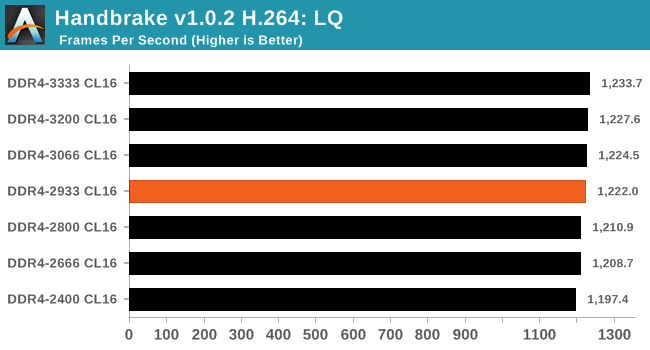
High Quality/Resolution H264: A similar test, but this time we take a ten-minute double 4K (3840x4320) file running at 60 Hz and transcode from Main to High, using the very-fast preset.
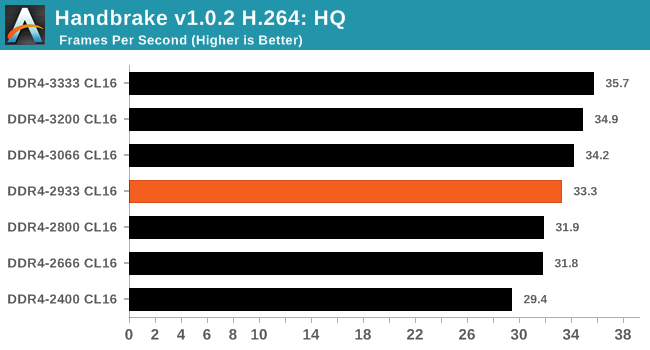
HEVC Test: Using the same video in HQ, we change the resolution and codec of the original video from 4K60 in H264 into 4K60 HEVC.
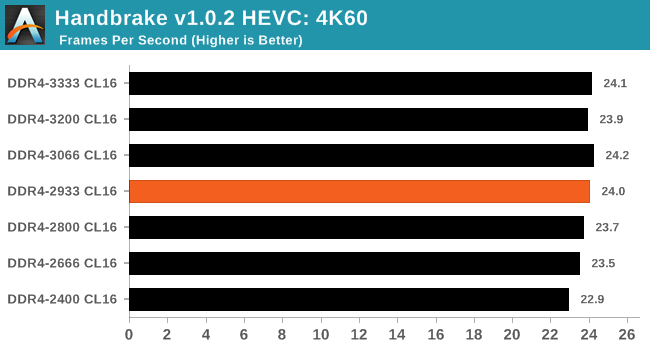
The biggest gains in Handbrake came in the HQ test where we gained up to an extra +21% in performance for DDR4-3333 over DDR4-2400. The fact that we don't see the same gains in the HEVC test is likely down to the algorithm.
Compression – WinRAR 5.40: link
For the 2017 test suite, we move to the latest version of WinRAR in our compression test. WinRAR in some quarters is more user friendly that 7-Zip, hence its inclusion. Rather than use a benchmark mode as we did with 7-Zip, here we take a set of files representative of a generic stack (33 video files in 1.37 GB, 2834 smaller website files in 370 folders in 150 MB) of compressible and incompressible formats. The results shown are the time taken to encode the file. Due to DRAM caching, we run the test 10 times and take the average of the last five runs when the benchmark is in a steady state.
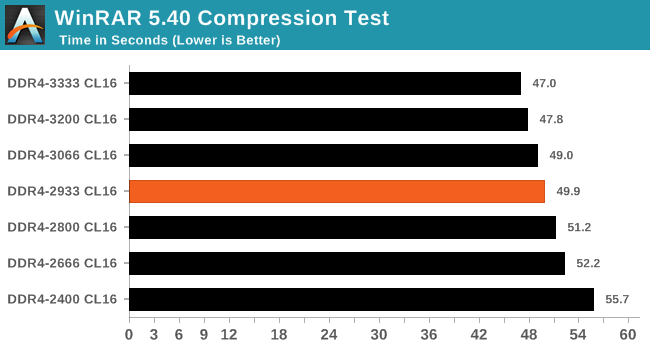
Like with Handbrake, the system seemed to scale pretty well in WinRAR with a ~16% performance gain going from DDR4-2400 to DDR4-3333.
3D Movement Algorithm Test v2.1
This is the latest version of the self-penned 3DPM benchmark. The goal of 3DPM is to simulate semi-optimized scientific algorithms taken directly from my doctorate thesis. Version 2.1 improves over 2.0 by passing the main particle structs by reference rather than by value, and decreasing the amount of double->float->double recasts the compiler was adding in. It affords a ~25% speed-up over v2.0, which means new data.
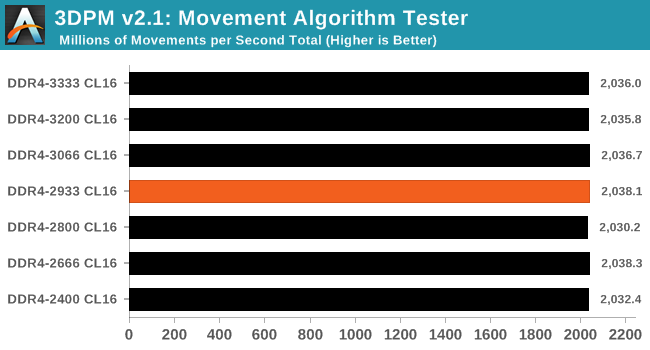
Although more of a raw CPU benchmark, it shows here that memory isn’t a massive factor, as regardless of memory speed, we encountered marginal performance gains.
POV-Ray 3.7: link
Another regular benchmark in most suites, POV-Ray is another ray-tracer but has been around for many years. It just so happens that during the run up to AMD's Ryzen launch, the code base started to get active again with developers making changes to the code and pushing out updates. Our version and benchmarking started just before that was happening, but given time we will see where the POV-Ray code ends up and adjust in due course.
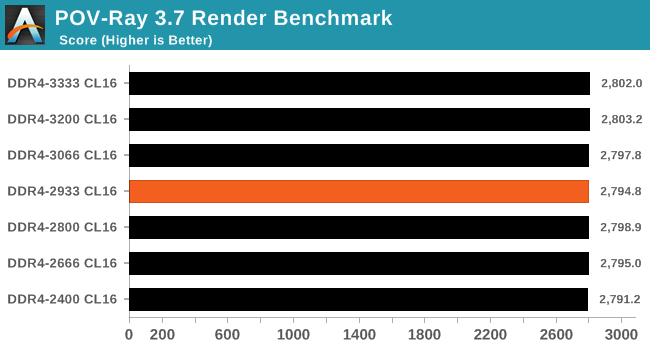
POV-Ray might be a fruitful benchmark for testing memory stability, but our performance variation between memory speeds was within the margin of error.
7-Zip 9.2: link
One of the freeware compression tools that offers good scaling performance between processors is 7-Zip. It runs under an open-source licence, is fast, and easy to use tool for power users. We run the benchmark mode via the command line for four loops and take the output score.
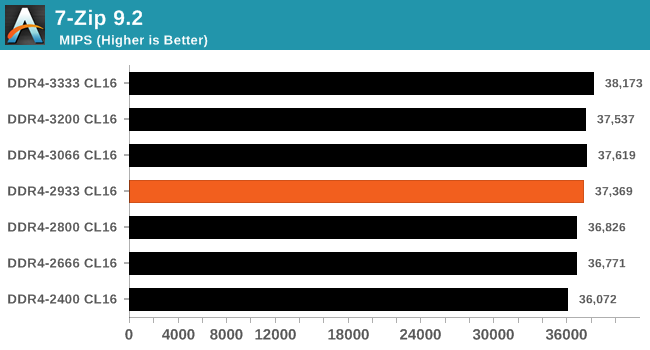
Some compression tools can be susceptible to memory performance and it shows in our results such as WinRAR. 7-zip has a small performance boost as we rise up through the stack, although the differences above DDR4-2666 are fairly minimal.










65 Comments
View All Comments
Threska - Saturday, September 30, 2017 - link
That could potentially be VERY interesting since GPUs are one of the few things that need a high bandwidth.Thefinaleofseem - Wednesday, September 27, 2017 - link
Pity that latency wasn't tested as well as clocks. It would be interesting to see how Ryzen scales with both factors.germz1986 - Wednesday, September 27, 2017 - link
I would really like to see a review of this G.Skill kit F4-3200C14D-16GFX, It seems it was the first ryzen optimized set for 3200 @ fairly low timings out of the box.kpb321 - Wednesday, September 27, 2017 - link
Small nitpickDDR4-2933 16-18-18 (Nearest to memory kit rating)
DDR4-3066 16-18-18
DDR4-3066 is actually closer to the memories kits rated 3000 speed. 2933 is the max speed supported by the processor that is below the rated speed of the kit. 3066 would be a slight overclock.
Gavin Bonshor - Wednesday, September 27, 2017 - link
It probably needs re-wording as 2933MHz CL16 is what the XMP profile runs at on Ryzen with this particular kit.nismotigerwvu - Wednesday, September 27, 2017 - link
Perhaps he was going by "The Price Is Right" rules :)Dr. Swag - Wednesday, September 27, 2017 - link
You guys should've lowered timings along with frequency to keep latency constant while increasing bandwidth/IF clock speedskpb321 - Wednesday, September 27, 2017 - link
Those ashes results are interesting. They are the only one that doesn't show a fairly straight forward improvement as memory speed increases. For the tested kit you'd actually get better performance dropping speed down to DDR4 2800 instead of DDR4 2933. Same thing if you are OCs the memory 3200 is faster than 3333.Overall this makes me happy that I decided to spend an extra buck or two when I put together my Ryzen system to grab a 3000 kit which happened to be from Team Group also over the typical 2400/2666 kits around the same price. I hadn't typically seen the value in paying a premium for faster memory kits but the even the early indications showed it was more important for Ryzen systems and this shows how important it can be.
DanNeely - Wednesday, September 27, 2017 - link
That result makes me suspect the dominant effect we're seeing is something random not memory related.SpartanJet - Wednesday, September 27, 2017 - link
Really disappointing results, all people talked about is how Ryzen scalled with memory. I guess I'm going with Intel 8700k after all.